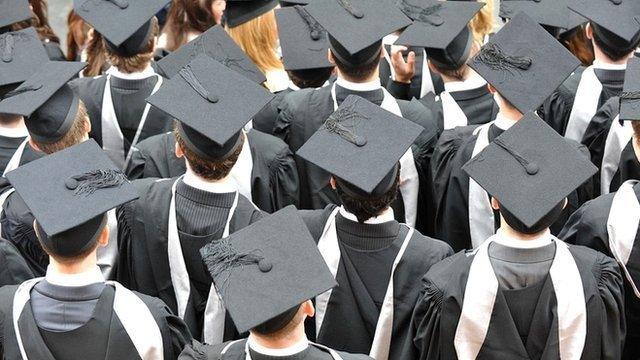Student loans interest rate to rise in line with inflation
- Published
- comments

Students in England, Wales and Northern Ireland will face interest rates on their loans of up to 6.3%, following an increase in the Retail Prices Index (RPI) measure of inflation.
The rise from 6.1% currently will take effect from September for students and graduates under the 2012 fee scheme.
The increase comes as the government is conducting a review of post-18 education and funding.
Ministers say the role of interest rates will be considered in the review.
The RPI inflation rate in March is used to set the interest on student loans from the following September.
Those starting or continuing at university this autumn will be charged interest of 6.3% - RPI at 3.3% plus 3% - from when they start studying, until the April after they graduate.
From that point, the loan becomes payable above a certain income threshold - which the government announced earlier this month is to be raised from £21,000 to £25,000.
For graduates, the interest is on a sliding scale - depending on their income after leaving university - from 3.3% up to the full 6.3% for the very highest earners.
The rise will not change individuals' monthly repayments, as these are based on how much they earn.
However, it could increase the total amount of debt for those paying back over the 30-year period.
This latest rise comes on the back of a significant rise in September 2017 from 4.6% to 6.1%.

Analysis by Education Editor, Branwen Jeffreys
The high interest rates, which begin the moment you start university, are one of the most contentious aspects of the student debt debate.
It is the middle earners who are most likely to feel the long-term impact of higher interest rates. That's because if your earnings are low as a graduate, a larger part of your total loan is likely to be written off by the government at the end of 30 years.
If you are a high earner you repay more quickly, because 9% of everything over the £25,000 earnings threshold is a bigger amount. Only around a quarter - the highest earners - are expected to fully repay their loan, a deliberate feature of the system.
But if you are a middle earner, you will earn enough to spend the 30 years repaying quite a large chunk of your loan, all now charged at a higher interest rate.

What does the government say?
A spokesman for the Department for Education said: "This change in interest rate will make no impact on a borrowers' monthly repayments and very few people are likely to be affected by the increase.
"Once the loans are in repayment, only borrowers earning over £45,000 are charged the maximum rate. This ensures that they make a fair contribution to the system."
He said the decision to raise the repayment wage threshold from £21,000 to £25,000 was saving 600,000 graduates up to £360 a year from this month.
"The government's review of post-18 education and funding is also under way and will look at how students and taxpayers are getting value for money, including the role of interest rates," he added.
What does the National Union of Students say?
The National Union of Students says that while the rise is small, it adds psychologically to the burden of debt for young people.
NUS vice-president Amatey Doku said: "Interest rates at 6.3% represent an increase of 0.2 [percentage points], which, although a seemingly small degree, adds to the huge psychological burden that debt has on many students and graduates.
"Absurdly high interest rates are only a small part of student debt problem - which already leaves students from disadvantaged backgrounds with up to £50,000 of debt, most of which is never paid off.
"The current funding model continues to represent a poor deal for students, their families, and the taxpayer."
- Published15 August 2017

- Published14 March 2018

- Published19 February 2018
